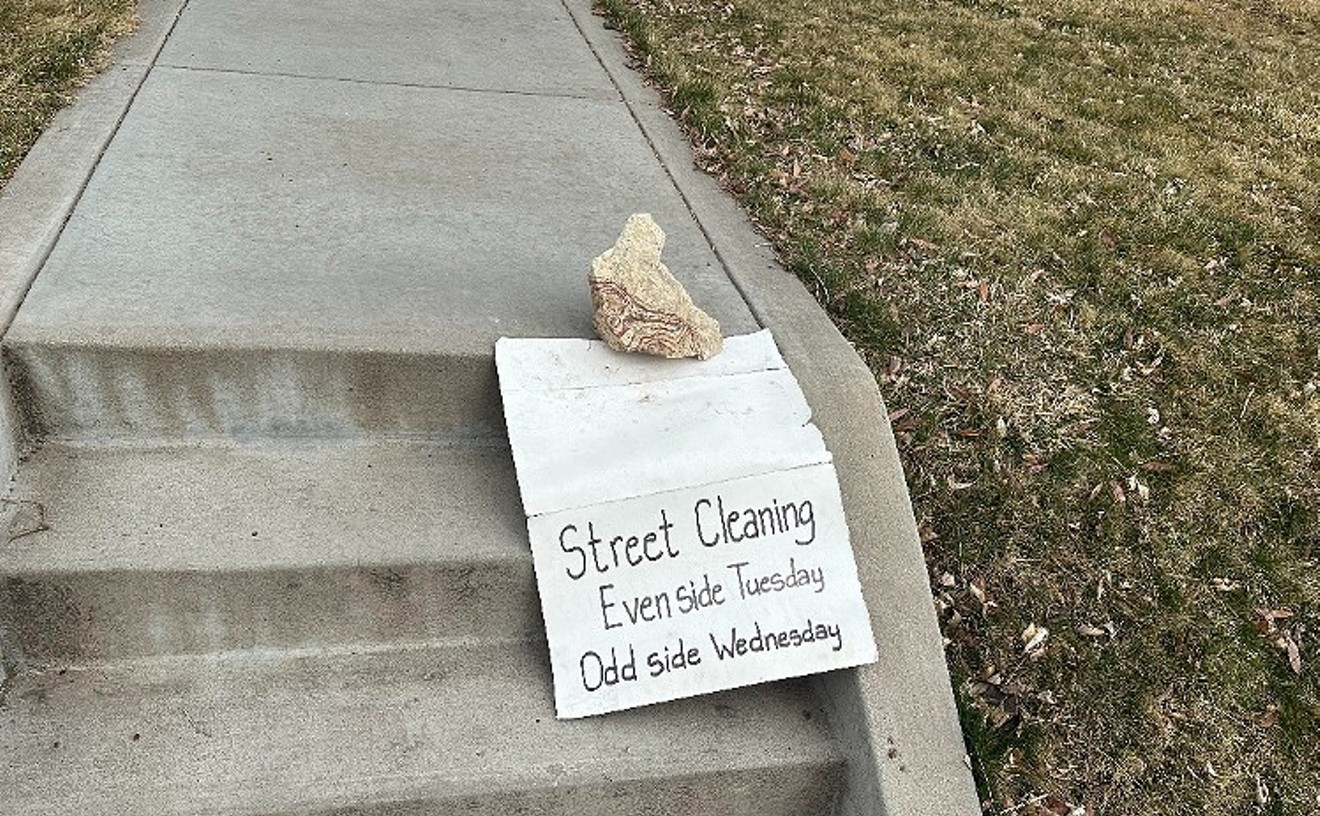So magistrate Terence Hunter of Boulder District Small Claims Court concluded that Swami Amar Jyoti, the guru of the Sacred Mountain Ashram west of Boulder, sexually assaulted Marcel more than twenty years ago. And Hunter awarded Marcel, who lives in Oregon, $3,500 plus interest--the maximum allowed--and court costs.
Marcel, who drove to Colorado for the opportunity to face the guru, said afterward that she was especially gratified that magistrate Hunter publicly found that Jyoti had committed second- and third-degree sexual assault. (Jyoti was not charged in criminal court in connection with the alleged assaults.)
"It seems to do more honor to what I've been through," she said. The money was awarded to compensate her for psychiatric counseling and medication for depression and anxiety that she says were a result of Jyoti's sexual attentions.
In April 1974 Marcel was a 23-year-old single mother and a student at Linfield College in McMinnville, Oregon, when she met Jyoti. The 46-year-old guru had been invited by one of her professors to speak at the campus.
Abused and neglected as a child and left with a five-year-old son after an early marriage had fallen apart, Marcel was seeking answers to her troubles and had been meditating and exploring different religions. She was moved by Jyoti's offer to help others find peace of mind. Her professor introduced her to Jyoti, who invited her to a private interview. What he wanted, she says, was sex.
"I was torn," she recalls. "He was saying this would help me spiritually. I wanted to believe. I was so vulnerable. I felt I had no choice."
Later he cautioned her not to tell anyone, saying it might hurt them spiritually. He had always intimated to his followers that he abstained from sex. He wore white robes as a sign of his purity.
"Desire is really poverty of the soul," he was once quoted as saying. "The more we desire, the more we degrade. Desires are disturbing, disharmonizing and tension-producing." Men and women were strictly segregated at his Truth Consciousness Inc. ashrams in Arizona, Michigan, California, New Zealand and India--all of which depended on the financial support of his disciples.
Before leaving Oregon, Jyoti told her that he was setting up the Sacred Mountain Ashram near the small Colorado mountain town of Gold Hill. He invited her to join him there and painted a picture of an idyllic voyage toward enlightenment while her son attended school and grew up on the ashram property.
They corresponded over the next year. He counseled her about her life and let her know that she was on track. She says she hoped that when he visited again, there would be no more requests for sex.
When he arrived in Oregon in 1975, she says, he again told her that having sex with him would help her grow spiritually. When she balked, she says, he threatened to withdraw his involvement in her spiritual life. For the followers of a Hindu guru, that's akin to being a goldfish when the fishbowl breaks.
She acquiesced. But then, she says, the demands increased. Jyoti let his disciples know that they had to renounce many of their earthly pleasures to follow him down the road to enlightenment. Marcel says she was shocked when he told her that it had been decided that no children would be allowed at Sacred Mountain Ashram.
"Yet he said I would still be welcome," she recalls. "He was asking me to give up my son. If I had done it, it would have been the last bridge; he would have had complete control over my life."
As a measure of the control he did have, Marcel actually went to a lawyer to discuss giving up her son. She sat her boy down and told him that she might be leaving him, never to return.
"It was the worst moment of my life," she says. "But I thought it was the best thing I could do if the goal was spiritual enlightenment, and that by becoming a better person, it would also have an effect on my son."
Marcel was still being pulled in two directions when she saw the guru again a year later. He invited her to a private audience in his room, where she tearfully explained her misgivings.
To her shock, she recalls, he grew angry with her. Gurus weren't supposed to get angry, except as a show to make a point.
"He seemed alarmed, because I was in a position to betray his secret," she says.
After chastising her, Jyoti told her to wash her face to hide the fact that she had been crying. He then sent her from the room, which was in a private Tacoma, Washington, residence where he was speaking.
Jyoti soon emerged and gave a fiery speech about what it meant to betray one's guru. "He talked about how Judas had to hang himself after betraying Jesus," she says. "I felt like I was going to die. I was so filled with fear."
Despite their falling out, she says, Jyoti still asked her to set up some secret place where they could rendezvous after his obligations in Tacoma were over. She says she told him that she didn't have the money, which was true, but she also didn't want to be alone with him.
Still, it took Marcel several more years to break the bonds to the guru. When it became clear that she would not give up her son, she says, Jyoti told her "there was an evilness in me and asked me not to call the ashram anymore because it would disturb the vibrations."
Marcel's twenties were lost to depression. She didn't trust people and shunned other spiritual groups and their leaders. She fell in love with a man, but it took six years for her to let down her guard enough to marry him.
It wasn't until about two years ago, she says, through counseling and a women's support group, that she was able to equate the guru's actions with her psychological problems. But it wasn't until she read in Westword about the guru's alleged dalliances with several other women ("The Paths of Righteousness," May 4, 1994) that she learned she wasn't alone.
Many of the guru's followers, some of whom had given up careers and families to follow him, were devastated when rumors of the sexual trysts began circulating in the ashrams in 1993. One married woman claimed to have been ordered to have two secret abortions rather than bear Jyoti's children. In 1993 the woman and her husband, who had divorced, each received a financial settlement from the guru; the amount was not disclosed publicly, but sources within the ashrams say it was more than $100,000 each.
At this point, the guru has sold the ashrams in New Zealand and Michigan--the California ashram had been sold years earlier. He also tried to unload some of his Colorado property, though not the Gold Hill ashram itself.
Marcel contacted Denver lawyer Juanita Benetin, who told her that because of the length of time that had passed, she could regain only the actual costs of her medical treatment and counseling plus legal costs. And that's if she won.
"These cases are lawyer-intensive and involve a lot of paperwork," Benetin says. "I've never seen one where the costs [to litigate] weren't at least $20,000."
Even if successful, Marcel would not have been awarded enough to compensate for the expense. So she decided to take another route: the Boulder Small Claims Court.
Marcel knew she would be able to receive only a few thousand dollars. But at least she would be able to tell her story in court, and neither she nor Jyoti would be represented by a lawyer.
With Benetin providing some legal advice, Marcel served papers on the guru's Boulder lawyer, Berkley Freeman. Attempts to talk to Jyoti were thwarted by his followers, who refused to say if he was in the United States or his native India. (Jyoti could not be reached for comment for this article.)
Shortly afterward, Marcel says, a woman who lived at the Arizona ashram called her to try to discourage her by saying they planned to get the case moved to county court, where Jyoti could be represented by a lawyer. (Freeman did not return telephone calls to Westword to discuss the case.)
"She said that things would get messy for me," Marcel says. "I told her that I had had twenty years to think about this...and that I would welcome the publicity so that he would be held accountable."
The swami made no move to transfer the case to another court. But neither did he appear last Thursday to face Marcel, who was accompanied to the courtroom for moral support by Benetin and another former member of the guru's ashram.
Magistrate Hunter noted that Marcel had a "disability" under the law because she was sexually assaulted by someone with whom she had a special relationship, such as that of a doctor and client, teacher and student or minister and parishioner.
Marcel says she was disappointed that she didn't get to accuse the man she says "shattered" her life face to face. And now she will have to look into ways to get her money, possibly by garnishing wages he is paid as the president of Truth Consciousness Inc.
In any case, she says, the magistrate's finding will make a "big difference" in her being able to close a painful chapter of her life.










